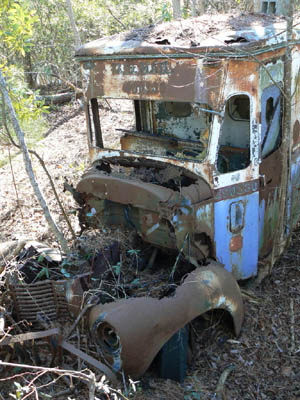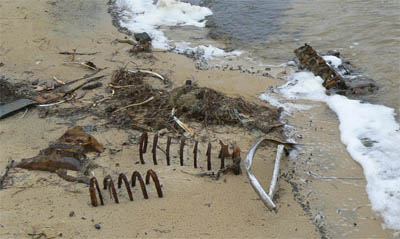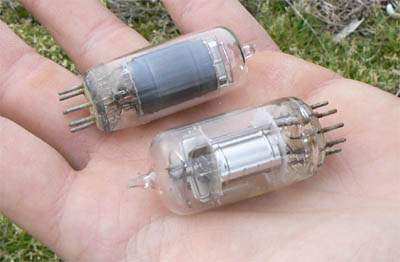Perhaps a law of evolution is that intelligence usually extinguishes itself. – Edward O. Wilson
In David Brin’s The Postman, greatest post-apocalyptic book ever, the protagonist finds shelter in an old mail truck and keeps warm by making a blanket out of the letters. Recently, Vicky and I checked out the Camden County Jeep Trail, where we came across the old mail truck below, inexplicably wedged between the trees way off the trail, as if it had been dropped from the sky into the wetlands. The style puts it at 50-plus years-old.
 Old Mail Truck Out in the Middle of a Swamp (Complete Mystery how it got there) GeoCoordinates: 36 12.197, -76 01.593 Credit: Vicky |
On another adventure, went exploring around the Newbold-White House Recreation Trail. There, on the shoreline, we found the nearly buried remnants of some sort of tractor, or automobile. Suspension springs and a rusting engine block were recognizable, just peaking out of the sand.
 Unidentified Species of Automobile Credit: Vicky Sawyer |
Many scientists agree that the Earth has entered a new geological age, the Anthropocene, marked by the profound changes we humans are making to the environment. It begins with the growth of farming 8,000 years ago, but the most dramatic effects have come with the industrial revolution.
The cars we found in the wilderness will quickly rust into unrecognizable dust, but the rubber tires and plastic will have longer lives. Plastic shopping bags can take up to 1,000 years to decompose, and if they are buried, they may not decompose at all… at least, not until something else on Earth evolves to get at the energy-rich hydrocarbons, found naturally in crude oil, just as microbes evolved to eat cellulose in plants.
 Sand Filled Radio Credit: Vicky Sawyer |
Glass is not biodegradable, and, unlike plastics, does not have any form of chemical energy stored within it. The silicas making up glass are also found in the cell walls of diatoms, but since the chemical compound is the most abundant mineral in the Earth’s crust, it’s doubtful life here will start deconstructing the glass we leave behind for spare parts.
 Perfectly Preserved Fuses Credit: Vicky Sawyer |
Wired magazine founder, Kevin Kelly, has coined the term Technium to refer the explosion of technology that survives within the unique ecological niche we have created. Modern life requires microwaves, computers, and cars. The best technologies survive and we reproduce them, evolve them to better suit our needs, and in this respect Kelly makes a persuasive argument that they are the “7th Kingdom of Life.”
If we go, the Technium will go, but together we have left a distinct mark on Earth’s timeline. An alien scientist studying the history of our planet millions of years from now will find a thin layer in the geological strata marked by heavy metals, plastic bottles, and a huge surge in carbon dioxide. The Earth will recover from us, but have to make sure we can recover from ourselves.
You can see more car fossil photos here.
Comments
3 responses to “Fossils of the Technium in the Anthropocene”